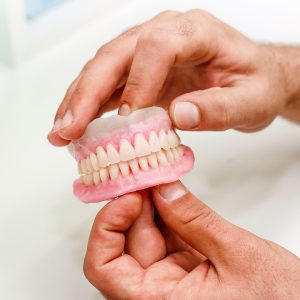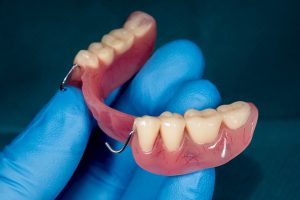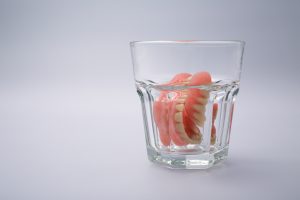Transforming Smiles: Full and Partial Dentures
Are you struggling with missing teeth and looking for solutions? At our West Sayville dental practice, Dr. Richard Sigismondi can reshape smiles and restore confidence with full and partial dentures. Learn how Dr. Richard Sigismondi can return your ability to eat, speak, and smile with confidence using these striking replacement teeth by dialing 631-563-1583.
What Are Dentures?
Dentures are prosthetic devices designed to replace missing teeth in the upper or lower jaw, or both the upper and lower jaw. They’re supported by the surrounding soft and hard tissues of the oral cavity. Dentures can be classified into two main categories, full dentures and partial dentures. Dentures can be made from various materials, with acrylic being the most common due to its ease of manipulation and resemblance to gum tissue. Dentures are designed to closely match the wearer’s natural teeth so that their smile appears whole again.
What Are Full Dentures?
Full dentures, also referred to as complete dentures, are a transformative solution for individuals facing complete tooth loss. They’re designed to replace all the teeth in one or both dental arches.
There are two types of full dentures:
- Conventional Dentures: These are made after the teeth have been extracted and the gums have healed. The denture is ready for placement in the mouth about eight to 12 weeks after the teeth have been removed.
- Immediate Dentures: These are made in advance and can be positioned as soon as the teeth are removed. This allows the wearer to not be without teeth during the healing period. However, bones and gums shrink over time, especially during the healing period following tooth removal. This means immediate dentures will only serve as a temporary solution compared to conventional dentures.
What Are Partial Dentures?
For those with some missing teeth but retaining others, partial dentures are an ideal solution. Partial dentures involve a framework with metal clasps. These claps hook onto the surrounding natural teeth, effectively filling the gaps left by missing ones.
There are two main types of partial dentures:
- Cast Partial Dentures: These dentures are made of a combination of acrylic and a cast alloy, such as cobalt-chrome. They’re more durable and less bulky than acrylic partial dentures, making them a popular choice.
- Flexible Partial Dentures: These dentures are made from a flexible, resin-based material that is more comfortable and aesthetically pleasing than traditional acrylic or cast partial dentures. They are especially suitable for people with allergies to acrylic or metal
Benefits of Full and Partial Dentures
Complete dentures and partials offer a wide array of benefits that have allowed them to remain a popular tooth-replacement option for many years. Some of the numerous benefits of full and partial dentures include:
- Restored Functionality: Both full and partial dentures excel in restoring proper chewing function and speech, ensuring day-to-day activities are not hindered by tooth loss.
- Enhanced Aesthetics: Full and partial dentures are custom-designed to match the natural contours of the face, providing a smile that not only restores but elevates confidence and self-esteem.
- Preserved Oral Health: Beyond aesthetic improvements, dentures prevent the shifting of remaining teeth, maintaining proper dental alignment and averting potential oral health issues linked to tooth loss.
- Improved Speech: Full and partial dentures facilitate effective articulation, promoting clear and confident communication for a heightened quality of life.
- Improved Facial Appearance: Full and partial dentures help maintain the natural contours of the face by filling in the gaps left by missing teeth, which can enhance the overall facial appearance.
- Increased Confidence: A well-fitting and natural-looking denture can boost self-confidence and self-esteem, as it allows the wearer to smile and interact with others without feeling self-conscious about their missing teeth.
- Cost-Effectiveness: Partial dentures can be a more affordable alternative to dental implants, especially when replacing one or more missing teeth. They are also a non-invasive and non-permanent solution, making them a cost-effective option for many patients.
- Ease of Maintenance: Both full and partial dentures can be easily cleaned and maintained by the wearer, ensuring proper oral hygiene and overall dental health.
Full and Partial Denture Process
Consultation
The journey to a new smile with full or partial dentures begins with a thorough consultation. During your initial consultation, your West Sayville dentist will evaluate your oral health and discuss the possibility of creating a personalized treatment plan for you. Your consultation is a great time to ask any questions or voice any concerns you may have.
Preparation
For full dentures, tooth extractions may be necessary. In the case of partial dentures, existing teeth are prepared for a secure fit. Impressions and measurements are then meticulously taken. These will serve as the basis for your new dentures.
Manufacturing
The specifications we took will be transmitted to a dental laboratory, where skilled technicians will craft dentures that fit properly and with precision. Professional engineering ensures not just a comfortable fit but a natural appearance.
Fitting
Patients return for a fitting appointment, during which Dr. Sigismondi assesses the fit, making any necessary adjustments for optimal comfort and functionality.
Adjustments
Regular check-ups are recommended to address any changes in oral structure or discomfort, ensuring ongoing support for the evolving needs of the mouth and dentures.
Caring for Full and Partial Dentures
Maintaining the longevity and functionality of dentures and artificial teeth is paramount. Dr. Sigismondi advises patients to do the following:
- Daily Cleaning: Brush dentures daily with a soft-bristle brush to remove plaque and prevent stains. It’s crucial to avoid using regular toothpaste, as it can be abrasive.
- Soaking: Soak dentures in a mild denture cleaner or a mixture of water and vinegar overnight to maintain their freshness.
- Handle With Care: When cleaning or removing dentures, it’s recommended to do so over a soft surface to prevent potential damage in case of accidental slips.
- Regular Check-ups: Scheduling regular dental check-ups with Dr. Sigismondi is essential to ensure optimal denture fit and promptly address any potential issues.
- Rinse after meals: Rinse your mouth and dentures with warm water after each meal to remove plaque and food debris.
- Clean Your Gums And Mouth: While your dentures are out of your mouth, use a damp washcloth or very soft toothbrush with warm water (or warm salt water) to clean your gums, tongue, lips, cheeks, and roof of your mouth.
- Store Dentures properly: When not in use, store your dentures in a denture case to prevent loss or damage.
- Keep Dentures Moist: Whenever you’re not wearing your dentures, place them in a glass of water or denture cleanser solution to keep them from drying out.
Frequently Asked Questions
It usually takes a few weeks for new denture wearers to get adjusted to wearing dentures, as they need time to adapt to speaking, eating, and drinking with the appliance.
The lifespan of dentures varies depending on the type and material. On average, dentures last about seven years, with some lasting between five and 12 years. Be sure to follow your dentist’s guidelines for caring for your dentures to make sure they last as long as possible.
The best type of dentures for you will depend on your dentist’s recommendations and your specific dental needs and preferences. This includes how many natural teeth remain and which teeth are missing in certain parts of your mouth. Consult with your dentist to determine the most suitable option.
Full and partial dentures may be covered by insurance, depending on the specific plan and the extent of the coverage. Most full dental insurance policies include restorative coverage, which means that up to 50% of the cost of dentures is covered, with the patient paying the remaining balance.
However, some employer-provided dental packages offer lower monthly costs but do not include restorative coverage, meaning the patient would have to pay the entire cost of the new dentures themselves. It is essential to review your insurance policy’s summary of benefits, call your insurance provider, and consult with your dentist to determine the level of coverage for dentures.




